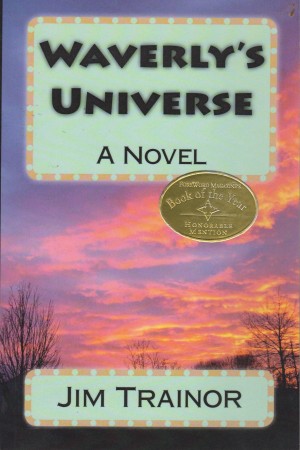
Waverly’s Universe by Jim Trainor (2012. Up North Press. ISBN 9780615709215)
Sorry, Rev. Trainor, but this is the weakest of the three books of yours I’ve read. There. That’s as plain as I can make it.
My friend Vicky gave me Trainor’s books as gifts a few years back. I previously read and reviewed Grasp, a nonfiction book examining faith and science (4 stars) and The Sand People, a contemporary Christian relationship novel (3 and 1/2 stars). It was clear to me after reviewing those books, and it’s clear to me now, that Trainor, who is both a scientist and an Episcopal priest, is a man of deep thought and spiritual belief. He is also a fair narrator when it comes to critically examining present-day issues and a decent nonfiction writer. But he is extremely limited as a storyteller. These observational points were reinforced in Waverly.
Josh Waverly, a physicist who works for a corporate laboratory in New Mexico, is a shallow imitation of his father, a world famous scientist whose expertise was parallel universes. Through a fairly incredible set of circumstances, the single and nerdy Josh is thrown together with an exotic and beautiful young Hispanic woman, Evangelina Gomez, who, we learn, has two very bad men after her. The bad guys (I’ll use a term that fits the level of the author’s plot and character development here) end up trying to kill not only Evangelina, but Josh, and Evangelina’s young daughter as Trainor tries his hand at a unique genre: the Christian action thriller. Reverend Trainor writes confidently and with purpose when he examines the inner lives, feelings, and motivations of the book’s protagonists but he is far less adept at dialogue, action, and plot. In a nutshell, had the author worked the story of the star-crossed lovers into a contemporary Christian novel akin to The Sand People, perhaps this effort would be more compelling. But this book was printed a year before The Sand People and presumably written before that work, meaning that Waverly evinces less polish and literary merit than its successor.
In the end, I think Reverend Trainor has much to say about science, faith, and human relationships. I’m just not certain that his vehicle for expression should be fiction. Jim Trainor did a fine job conveying a message in Grasp. Nonfiction seems to be his strength and I’d recommend that he continue to explore that medium and leave fiction to less linear writers.
3 stars out of 5. Readable but not compelling.
Peace.
Mark


